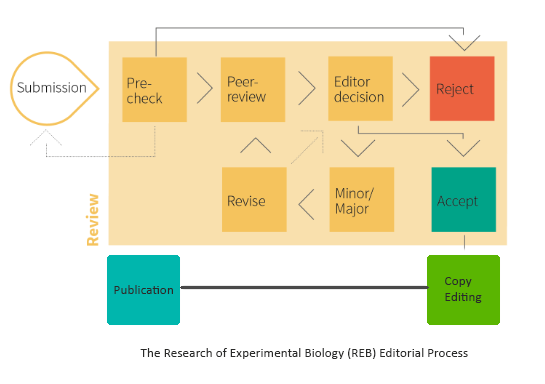
Peer review is central to the publishing process and is fundamental in maintaining the published literature's integrity and advancing discovery. Only manuscripts of sufficient quality that meet the aims and scope of Research of Experimental Biology (REB) will be processed for review.
Generally, two reviewers with the Double-Blind Peer Review Process will evaluate each manuscript based on the terms of the scope, scientific rigor of the experimental design, data adequacy, conclusions' validity, importance, originality, adequacy of the literature citations, clarity of the presentation, and format. Manuscripts will be given a quality (priority) ranking by each reviewer. Only manuscripts with high-priority rankings will be accepted, even though they may have been classed as generally acceptable. If reviewers differ significantly in their opinions, the decision will be based on the priority rankings and/or the opinion of an additional reviewer (arbiter). Usually, revised manuscripts are returned to the original reviewers and the authors' responses.
Articles may be accepted without revision, minor revisions, major revisions, or rejected. The results of reviewed articles by reviewers will be notified to the author via email. The author can revise his article based on the reviewers' suggestions (and the editor's) six weeks after the email notification.
Here you may find a sample model of the open peer review process in REB.

The Editors of REB recognize that scientifically sound, high-quality manuscripts are often turned away from broad-scope "high-impact" journals based on the issue of "general interest." As a specialist journal, REB will consider rapid publication of such manuscripts if they are submitted with the original peer reviewer reports, rejection letter, and a brief rebuttal of the reviewers’ comments.
REB is committed to peer-review integrity and upholding the highest standards of review. Once the editor has assessed your paper's suitability, it will be double-blind peer-reviewed by independent peers within the relevant field. We believe in the integrity of peer review with every journal we publish ascribing to the following statement:
All published research articles in this journal have undergone rigorous peer review based on initial editor screening, anonymous refereeing by independent expert referees, and consequent revision by article authors when required.
We sincerely thank reviewers who give their time to peer-review articles submitted to REB. Rigorous peer review is the cornerstone of high-quality academic publishing.
At least two experts review manuscripts submitted to REB. Reviewers are asked to evaluate the manuscript's quality and to recommend to the external editor whether a manuscript can be accepted, requires revisions, or should be rejected.
Reviewers should keep the manuscript's content, including the abstract, confidential. Reviewers must inform the Editorial if they would like a student or colleague to complete the review on their behalf.
REB operates a double-blind peer review. Reviewers should be careful not to reveal their identity to the authors in their comments or in metadata for reports submitted in Microsoft Word or PDF format. In all other cases, review reports are considered confidential and will only be disclosed with the explicit permission of the reviewer.
We are happy to welcome experts willing to build and advance the REB. We call you to be the Editorial Board or Reviewer here. Your performance will be highly appreciated. Please feel free to fill out this form to join us.
The reviewer REB is responsible for both the author and the editor regarding the manuscript. Peer review is the principal mechanism by which the quality of research is judged. Most funding decisions in science and the academic advancement of scientists are based on peer-reviewed publications.
Editorial Board
Pendidikan Biologi - UHAMKA
Jl. Tanah Merdeka, Ps. Rebo
Jakarta, Indonesia
